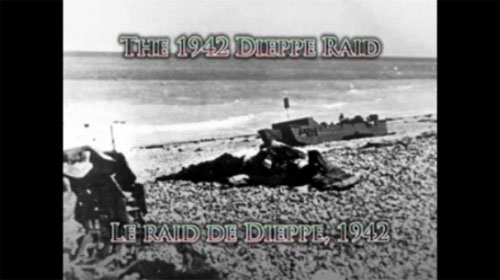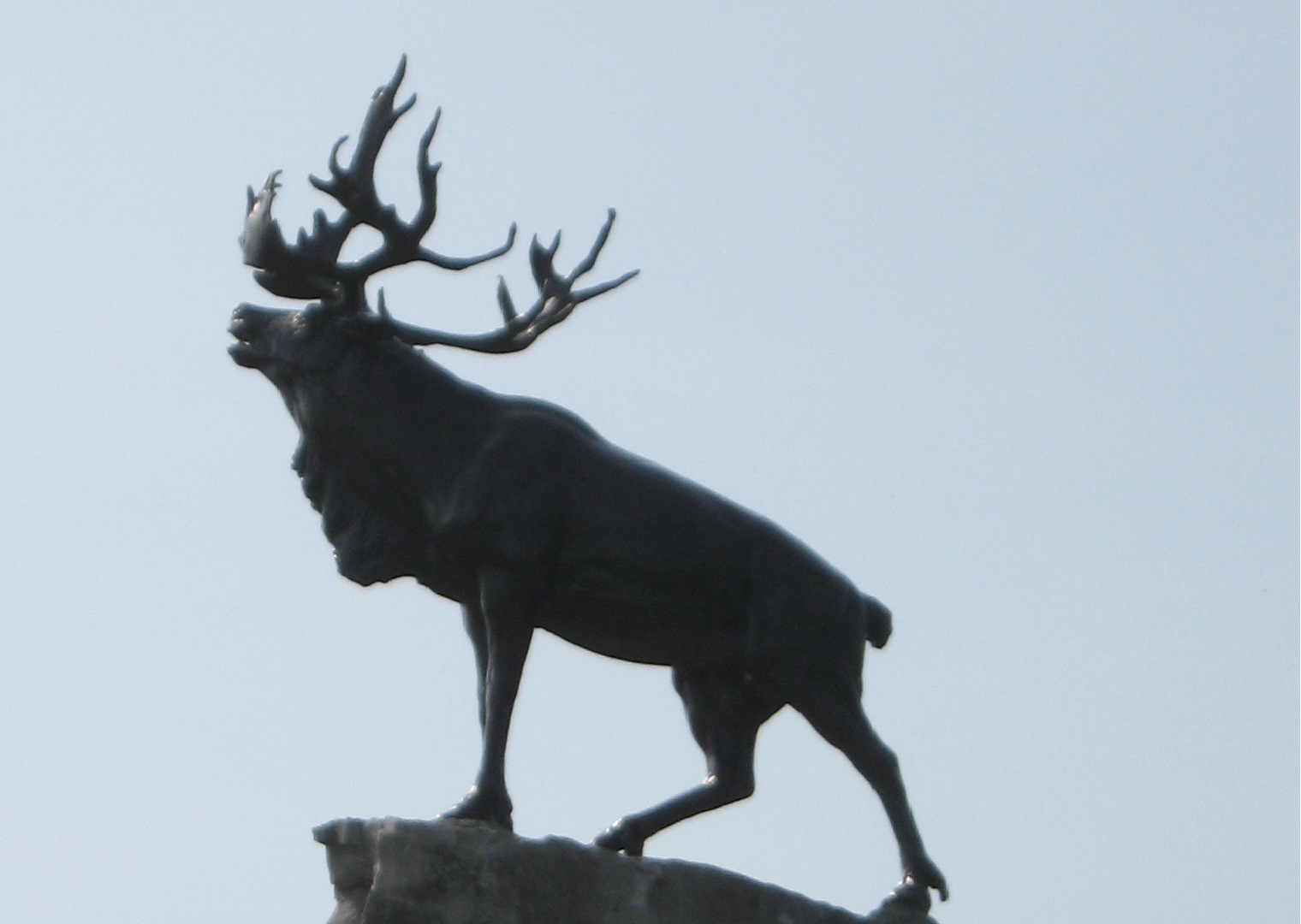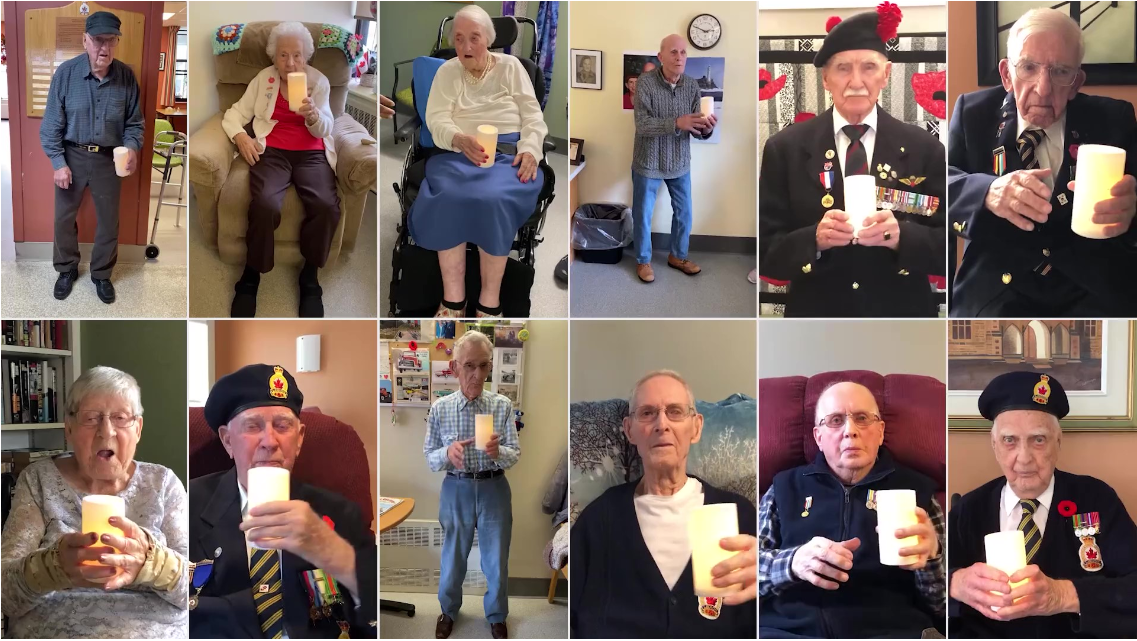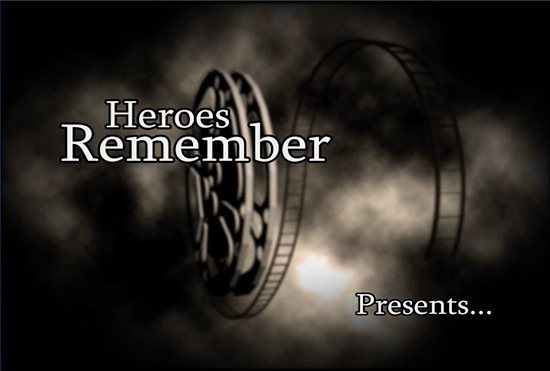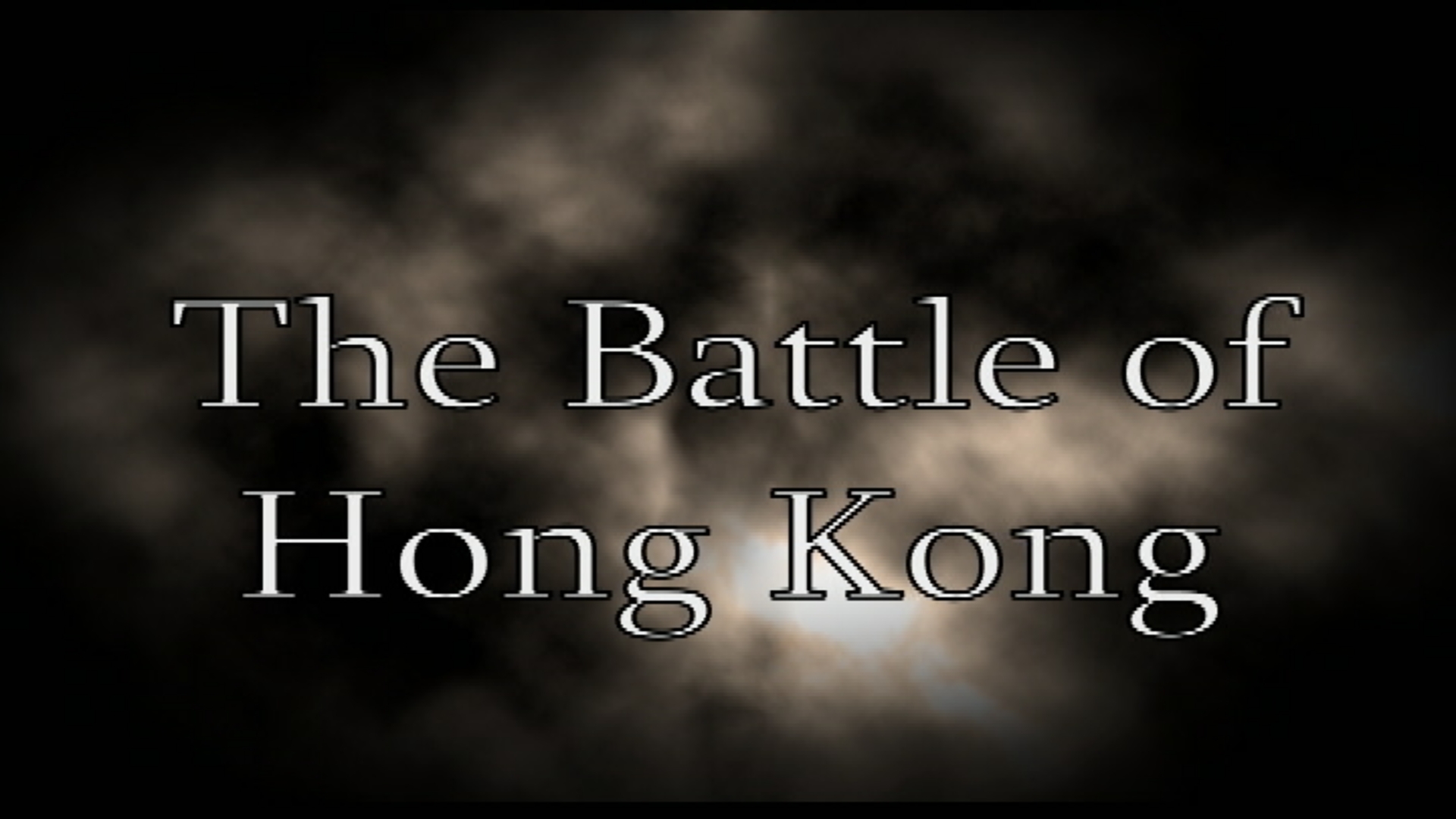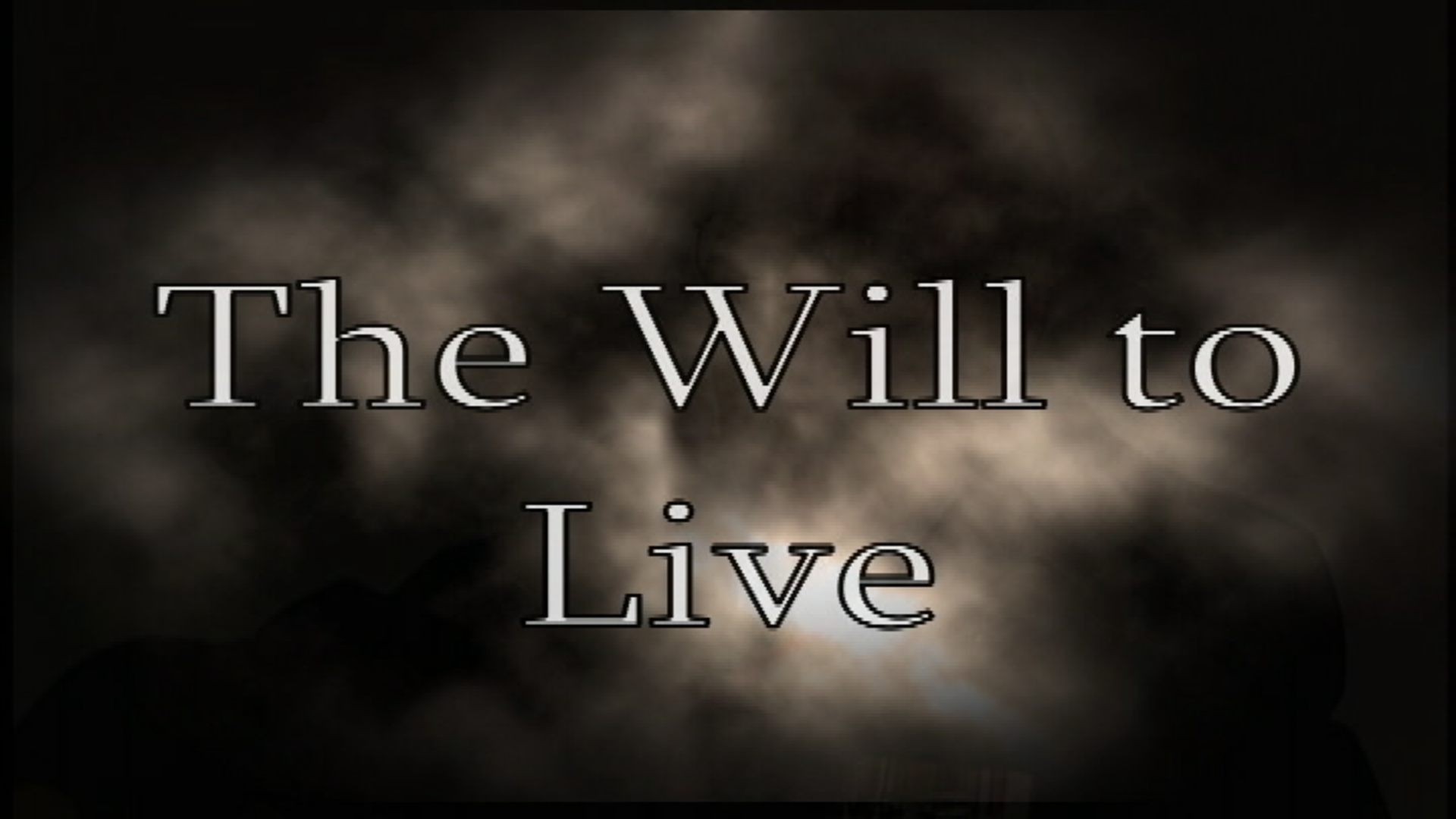Liberation of the Netherlands
Heroes Remembers Presents
Liberation of the Netherlands
Transcript
Truck towing artillery gun, crossing the Dutch Frontier.
They started getting into Holland and the Germans dug down, started to fight back. And that's when Jerry started sending out these V-bombs.German V bomb flying through the sky.
They were the darnedest things you know. They sounded like a motorcycle without a muffler and you knew when they were coming. And all of a sudden, we ran over Teller mines,Tracks of a destroyed tank.
took the track off and everything went ablaze, where I can to I was about 30, 40 feet from where the Bren Gun Carrier was. There was a hay stack, it turned out that it was a camouflage 88 gunSoldier in trench ducking, 88 Gun in camouflage netting being fired.
and they are deadly guns.Round from gun exploding in field.
It was called enfillade fire which is sideways fire.Enfillade fire hitting the water in the Canal.
So they had placed machine guns lengthwise to the canal so they could fire down the canal and shoot the hell out of us.Soldiers on rafts floating down the Canal.
This was the same time we knew the Germans were on the run, like an animal on the run is vicious. Like it was mostly on the dykes where we were fighting.Tanks rolling along side a Canal.
Like we'd be dug in one dyke and across the other side dyke,Soldiers disembarking boats along the dykes.
there was water in between. Then the Germans would be on the other. And of course they kept, that they were in places, dykes that they were travelling on,Soldiers burying explosives to blow up a dyke.
they kept them covered with fire all the time,Dyke exploding.
artillery fire or something like that all the time. You didn't do much moving around, but all we would do was taking bearings of German gunfire. You see troop movement, took bearings, and then our artillery was to bomb them.Soldiers taking bearings of German artillery fire.
And patrols became another thing, where we would be patrolling every night. There were different types of patrols. There was a listening patrol,Soldiers on patrol.
there were fighting patrols, there were capture patrols. To get in a loaded buffalo, you can't have too many waves because you may be six inches to three inches to the water.Loaded buffalo with Troops travelling down a river.
Children huddled together.
We thought we were hungry but we weren't hungry at all, we just thought we were. And there was about seven or eight children of age of maybe ten, something like that, standing there with a hungry look on their face. We all gave them our breakfast, we didn't take any. I saw for the first time in my life, cases of what they call starvation edema. Edema is a swelling of the body and this occurred in children. There was a little girl in the store front she had a brussels sprout and there was no sprouts on it, she was just chewing on the stalk. And there were three other little children who were just as hungry as she was and they stalked her like wolves.Soldiers marching past destroyed homes.
And the ones you joined up with and went into battle with are becoming less and less, then mentally you become that you know it's your turn next. It just has to be, because they're all gone. I got hit, side of the head I guess, helmet, the doctor said that's what saved my life was the helmet.Medic tending to injured soldier on the ground.
Cause it took one eye out completely, damaged the other one. I was standing on the seat and it blew me out.Tanks travelling on road.
The rest incinerated right there, they never did get out.Soldiers working on a tank with engine trouble.
Tank travelling with soldiers on top.
That was on the 3rd of May, the war was over on the 5th of May.Soldier being carried to medic tent on a stretcher.
The greatest thing for the morale of troops is, in the front line, is to know that there are first aid facilities, ambulances and so on, right there in the front. They had a casualty clearing station.Patient bering transferred from stretcher to operating table.
Casualties were brought into the casualty clearing station and were shipped back to hospitals. Just taking an extra minute just to stop by the bed sideNurse checking of patients in a hospital.
and say "Well how are you today, have you heard from home?" These kinds of things were what made the difference in the lives of the wounded, I think. When we were in that hospital, the water main got brokenNurses checking vital signs of a patient.
and a bunch of these ladies got together when we had no water and they formed a bucket brigade. And they were coming across there with their bucket and laughing and talking and a machine gunner shot them all down, right in the middle of that road. We were clearing a house one night and I walked up and I kicked this door open. The door across room flew open, a guy standing there. I started lifting up the rifle, he started to lift his up and I said, "This guy's gonna beat me." So I pulled the trigger anyway, you know, I figured if I scare him I might get another shot. There was myself in the full-lenght mirror across the room. So I shot myself in a mirror. I took the pin out of the grenade and I just held, and it was left in this hand. I didn't throw it away like the other one, and I had it ready to go and there was another noise. I was just gonna roll it down the stairs and I hear a baby crying. You're never the same person if you ever take somebody else's life, it does something to you. Down the road comes the German army, then we opened fire.Soldiers walking along country roads.
We caught all them, they didn't even know we were there,Soldier running through fog.
cause I was a butcher, but it was war. Then I got word from the set that I was to open up with the flame throwers.Flame thrower being fired at vehicle.
You realize that there were human beings there, so you know what I did? I got the Padre.A path of flames across a stream to the other side of embankment.
I wanted somebody to tell me this was okay. I mean you don't burn people alive. I didn't join the army for that. It's the easiest thing in the world to kill a person. It is, but it's awful hard to live with it afterwards. I thought, if I hadn't killed him, he'd be a grandfather like me.Picture of a Soldier with a blank look on his face.
And he would have, he had two children and I have three grand children I wouldn't have.Troops walking on a road, past vehicles in a wooded area.
We'd be travelling along the roads in Holland, we'd see rifles piled up sky high. They just threw the rifles on one pile there and they were just, they knew the war was over. Twelve, fourteen, fifteen year old kids, and sixty and seventy year old men. That was really sickning to see it.Detainees with their hands in the air, held at gunpoint.
And this is what this proud nation had come to.Another detainee looking tired.
They were put into compounds and our jobPOW being filed into a compound.
was to prevent the resistance movement from getting inThe large number of detainees gathered in a compound.
and killing them because they'd given up all their arms and were all there, which was a funny position to be in. The Dutch were, you know, they joined in with the Germans and they called them the "Dutch SS". We had a lot of them there.Footage of a ceremony.
You got to understand too,Man with his arm's raised being pushed by soldier as a crowd gathers.
there were, German soldiers there for six years, a lot of those girls probably had married German soldiersDutch civilians who had ties to German troops being paraded down city streets.
or had mixed with them. If anybody had done anything like that, they were outcasted. They'd throw them up in the air in a blanket and shave all their hair off and then let them out. And these girls would go up, put kerchiefs on their heads,Women getting her hair chopped off and then being displayed in front of a crowd.
lean out the window and watch the others being humiliated.Gun being fired from behind camouflage netting.
And the order we'd heard on the guns we'd never heard since D-Day, "Cease fire, empty guns". The war was over. I can understand why you kiss the soil that you come back to. You come back to freedom.Large number of civilians walking down a road and through city streets as a celebration parade for the end of the war.
And everybody had something orange on, for the House of Orange. You know, arm bands and little girls had hair ribbons and they sang their beautiful national anthem, they had their own flags. It was wonderful.Dutch flag being raised on a flag pole.
And they even took their peopleWomen in hospital bed being taken outside to see the celebrations.
who were sick in their beds out there so they could see us, shake hands, touch us and give us flowers.Women surronding an Allied Soldier showing their gratitude.
Women galore, trying to get at you, you know,Civilians lifting soldiers up and shaking thier hands.
just to shake your hand or kiss you or bring you flowers. But I mean it was, oh god, it was hard to describe because there were so many people.Picture of a young girl laying down a wreath on the grave of a fallen soldier.
Military gravesite.
It doesn't come free, we've given up an awful lot, and they're out there, under the stones.Aerial view of cemetary.
Description
Meta Data
- Medium:
- Video
- Owner:
- Veterans Affairs Canada
- Duration:
- 9:56
- Person Interviewed:
- Heroes Remember Presents
- War, Conflict or Mission:
- Second World War
- Location/Theatre:
- Holland/Netherlands
Related Videos
- Date modified:



